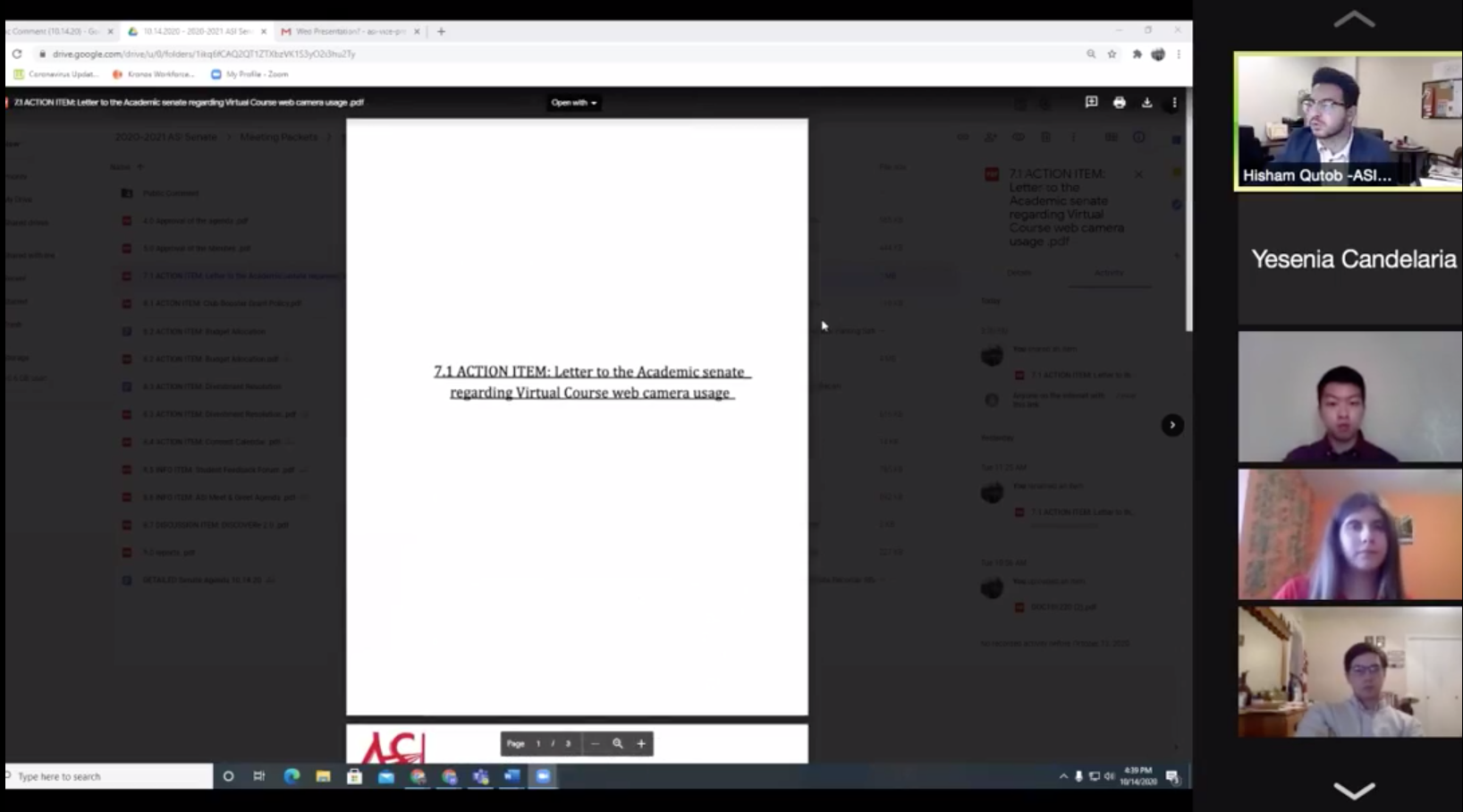Associated Students, Inc. (ASI) publicly supported allowing students to turn off their cameras during any virtual classes by voting unanimously to send a letter to the academic senate during their Zoom meeting on Oct. 14.
ASI sent a letter to the academic senate informing that body of its stance.
“Rather than telling the academic senate what to do, I thought a letter of support [of students not being required to have cameras off during classes] might be more well-received,” Hisham Qutob, executive vice president of ASI, said. “It is essentially receiving the same goal as voting on a resolution which is requesting that faculty don’t establish a policy that would require students to have a camera.”
Other ASI senators agree that students shouldn’t be forced to turn their cameras on in synchronous classes.
“Students who wish not to have their cameras on have a good reason for not wanting to do so,” Taj Harris, senator of athletics and recreation, said. “Whether students think they might be a distraction to the rest of the class or they are self-conscious of their appearance or living environment, all are acceptable reasons.”
Malakeh Jaber, senator of greek affairs, said she thinks requiring a policy that allows students to not have their camera be required during class times is needed.
She has had a classmate who had to inform the entire class that they were not fortunate enough to have their own room because the teacher asked them to turn on their camera.
“When some individuals in my classes have been asked to turn on their camera, due to the professors’ policy, they were forced to expose the class to personal information that they shouldn’t have to disclose,” Jaber said.
Icarus Bailey, a third-year linguistics major, said he has a professor that tells students they need to turn on their cameras.
“When we have our cameras off, my professor calls students by name and tells them to turn on their camera,” Bailey said. “No one has argued with the teacher at that point, so I don’t know if that would be considered being forced to or not.”
When Bailey turned on his camera once, he said he noticed people laughing and making comments with other classmates about his living situation.
“Having to turn on my camera makes me anxious,” Bailey said. “It makes me feel like I have to give up a little dignity for online classes.”
Brenda Jaramillo-Becerra, a fourth-year child development major, said if professors required students to turn on their cameras, she would see it as a form of invasion of privacy in a students home.
“Having one’s camera on should be a decision of the student and if they are not dedicated in the class, then their performance will show in their grades,” Jaramillo-Becerra said.
Although Jaramillo-Becerra has never been required to turn her camera on during classes, she turns her camera on whenever she can.
“I do not want my professors to think I am being rude or not caring towards them or the material being presented,” Jaramillo-Becerra said. “But there are times when both my daughter and I have class at the same time, and I have to keep guiding her distance learning or when my infant is in my arms wiggling around.”
Fresno State would never make a policy that would require all students to turn their cameras on during virtual classes, said Thomas Holyoke, professor and chair of the academic senate.
However, individual professors can make their own class policies that require students to turn their cameras on, creating confusion on whether they can enforce it or not, Holyoke said.
Jaber said that some professors are enforcing a camera on during class rule by including it into their participation grade.
“If participation is required for that class, there is no reason a student could not participate through the chat,” Holyoke said.
There is also the option of creating class surveys for students to fill out for participation points, Jaber said.
“I had a classmate [who was] unable to turn on their audio because of the environment around them [being] very loud,” Jaber said. “I don’t think that discredits that student from participating. They could be taking detailed notes and wanting to participate.”
“By creating a policy that does not enforce students to turn their cameras on, it would create a defense for students,” Julia Larralde, senator of parking and safety, said. “Students could show or talk about the policy when their professors asked to turn their camera on.”
Bailey said that just by being present during class and participating in class over a microphone should be enough. Adding video as a requirement only creates another source of stress and tension between students, he said.
Harris believes that an important factor on this topic is the respect between Fresno State’s administrators, faculty and students.
“It becomes a line of respect,” Harris said. “Administration has to respect the students’ choice: whether they chose to have their cameras on or off.”




